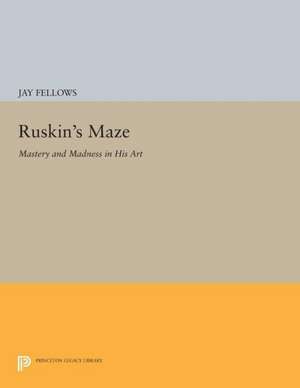Ruskin`s Maze – Mastery and Madness in His Art: Princeton Legacy Library
Autor Jay Fellowsen Limba Engleză Paperback – 30 iun 2014
| Toate formatele și edițiile | Preț | Express |
|---|---|---|
| Paperback (1) | 422.53 lei 6-8 săpt. | |
| Princeton University Press – 30 iun 2014 | 422.53 lei 6-8 săpt. | |
| Hardback (1) | 798.88 lei 6-8 săpt. | |
| Princeton University Press – 18 apr 2016 | 798.88 lei 6-8 săpt. |
Din seria Princeton Legacy Library
-
 Preț: 437.79 lei
Preț: 437.79 lei -
 Preț: 170.92 lei
Preț: 170.92 lei - 16%
 Preț: 683.62 lei
Preț: 683.62 lei - 16%
 Preț: 2324.07 lei
Preț: 2324.07 lei -
 Preț: 376.98 lei
Preț: 376.98 lei - 23%
 Preț: 780.24 lei
Preț: 780.24 lei -
 Preț: 377.30 lei
Preț: 377.30 lei -
 Preț: 313.18 lei
Preț: 313.18 lei - 16%
 Preț: 882.79 lei
Preț: 882.79 lei - 16%
 Preț: 736.39 lei
Preț: 736.39 lei - 16%
 Preț: 860.07 lei
Preț: 860.07 lei -
 Preț: 362.12 lei
Preț: 362.12 lei -
 Preț: 223.24 lei
Preț: 223.24 lei -
 Preț: 363.10 lei
Preț: 363.10 lei - 16%
 Preț: 915.46 lei
Preț: 915.46 lei -
 Preț: 340.21 lei
Preț: 340.21 lei - 16%
 Preț: 835.11 lei
Preț: 835.11 lei -
 Preț: 266.84 lei
Preț: 266.84 lei -
 Preț: 317.65 lei
Preț: 317.65 lei -
 Preț: 329.09 lei
Preț: 329.09 lei -
 Preț: 265.73 lei
Preț: 265.73 lei -
 Preț: 260.54 lei
Preț: 260.54 lei -
 Preț: 314.84 lei
Preț: 314.84 lei -
 Preț: 402.66 lei
Preț: 402.66 lei -
 Preț: 464.18 lei
Preț: 464.18 lei -
 Preț: 351.09 lei
Preț: 351.09 lei -
 Preț: 483.81 lei
Preț: 483.81 lei - 19%
 Preț: 500.29 lei
Preț: 500.29 lei -
 Preț: 388.44 lei
Preț: 388.44 lei -
 Preț: 328.48 lei
Preț: 328.48 lei - 23%
 Preț: 742.04 lei
Preț: 742.04 lei -
 Preț: 372.92 lei
Preț: 372.92 lei -
 Preț: 328.70 lei
Preț: 328.70 lei - 19%
 Preț: 505.89 lei
Preț: 505.89 lei -
 Preț: 446.25 lei
Preț: 446.25 lei -
 Preț: 289.17 lei
Preț: 289.17 lei - 19%
 Preț: 575.53 lei
Preț: 575.53 lei -
 Preț: 447.20 lei
Preț: 447.20 lei -
 Preț: 484.19 lei
Preț: 484.19 lei -
 Preț: 271.12 lei
Preț: 271.12 lei -
 Preț: 314.46 lei
Preț: 314.46 lei -
 Preț: 362.51 lei
Preț: 362.51 lei -
 Preț: 307.07 lei
Preț: 307.07 lei - 19%
 Preț: 498.46 lei
Preț: 498.46 lei -
 Preț: 272.27 lei
Preț: 272.27 lei - 19%
 Preț: 458.44 lei
Preț: 458.44 lei -
 Preț: 406.20 lei
Preț: 406.20 lei - 19%
 Preț: 515.73 lei
Preț: 515.73 lei -
 Preț: 428.88 lei
Preț: 428.88 lei -
 Preț: 369.27 lei
Preț: 369.27 lei
Preț: 422.53 lei
Nou
Puncte Express: 634
Preț estimativ în valută:
80.86€ • 84.52$ • 68.33£
80.86€ • 84.52$ • 68.33£
Carte tipărită la comandă
Livrare economică 06-20 martie
Preluare comenzi: 021 569.72.76
Specificații
ISBN-13: 9780691614816
ISBN-10: 0691614814
Pagini: 322
Ilustrații: black & white illustrations
Dimensiuni: 216 x 277 x 18 mm
Greutate: 0.75 kg
Editura: Princeton University Press
Seria Princeton Legacy Library
ISBN-10: 0691614814
Pagini: 322
Ilustrații: black & white illustrations
Dimensiuni: 216 x 277 x 18 mm
Greutate: 0.75 kg
Editura: Princeton University Press
Seria Princeton Legacy Library
Descriere
Descriere de la o altă ediție sau format:
Professor Fellows presents a map of Ruskin's mind as it shifts from conditions of mastery to madness. In his study, he examines and transcribes the ways in which Ruskin observed his dislocation of imagination and shows how, in the very process of disintegration; he was enabled by his peculiar genius to transform the effects on his language and conc
Professor Fellows presents a map of Ruskin's mind as it shifts from conditions of mastery to madness. In his study, he examines and transcribes the ways in which Ruskin observed his dislocation of imagination and shows how, in the very process of disintegration; he was enabled by his peculiar genius to transform the effects on his language and conc
